The best 65-inch TV 2024: big screens for every budget
The best 65-inch 4K TVs for big-screen action
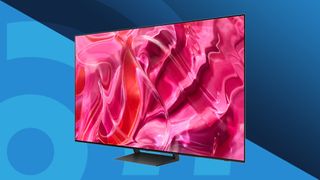
The best 65-inch TVs are the ideal way to get fully immersed in movies and games. They've become so much more more affordable in the last few years, which means you can get some seriously high-quality screen tech for very reasonable prices.
Of course, any list of the best 65-inch TVs will also include some money-no-object sets – some of the best OLED TVs with next-gen tech or best 8K TVs are available at this size – but you might be surprised by how little difference there is between these and the price of the best 55-inch TVs in many cases.
When we test 65-inch TVs, we take objective readings of elements such as their color accuracy and brightness levels, and combine those with our subjective opinion and experience of how natural the detail is and how realistic their motion processing looks to evaluate the whole image quality. We know what to expect from the best TVs at all kinds of price levels because we've tested so many, so we balance performance against cost and features to arrive at the list below.

I've been testing and reporting on TVs since 2017, but my experience writing about and reviewing screen technology stretches back to 2010. I love seeing all the latest TV releases as they come through our testing rooms, and I work with our reviewers and editors to agree which TVs we think best fit different needs, or represent the best value.
The best 65-inch TVs on Black Friday
Black Friday doesn’t officially arrive until November 29, but we’re already seeing early Black Friday deals on the TVs featured in this guide. Among the best Black Friday 65-inch TV deals we’ve tracked are price cuts on top models from Samsung and LG. Even the 65-inch Amazon Omni QLED TV, a best budget pick in this guide, is getting a 25% discount in the US (and a smaller 10% discount in the UK) in a limited-time deal.
For shoppers in the US, Walmart, Best Buy, and Samsung have all launched their official Black Friday TV deals. You’ll find live Black Friday deals in the UK at Currys, Argos, John Lewis, and Samsung. Amazon can also be counted on for a steady stream of early Black Friday deals, though a more complete array of discounts will arrive on the big, black shopping day.
Along with the Amazon Fire TV deal mentioned above, early sales we’ve listed in our Black Friday 65-inch TV deals guide include discounts in the 40% range on top TVs such as the Hisense U8N and Samsung Q80D. Those are big bargains to see drop in advance of Black Friday, so if you’re in the market for a new 65-inch and have been waiting on a great deal, now is the time to act.
The best 65-inch TVs of 2024
Why you can trust TechRadar
Below you'll find full write-ups for each of the best 65-inch TVs in our list. We've tested each one extensively, so you can be sure that our recommendations can be trusted.
The best 65-inch TV overall
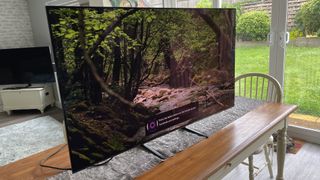
Specifications
Reasons to buy
Reasons to avoid
✅ You want QD-OLED for cheaper: The Samsung S90C gives you access to fantastic QD-OLED tech for cheaper than ever before.
✅ You want a TV that's built for gaming and movies: Extensive gaming features including 144Hz refresh rate and AMD FreeSync Premium combined with a gorgeous QD-OLED picture means the Samsung S90C can do it all.
❌ You want the best of QD-OLED: Although still a phenomenal TV, the Samsung S90C doesn't offer all that QD-OLED can like the Samsung S95C does.
❌You want Dolby Vision: The Samsung S90C supports HDR10+, but doesn't support Dolby Vision – the same as every other Samsung TV.
When Samsung introduced its exciting new QD-OLED technology in 2022, it was at a premium price. The S90C is not only an improvement on its predecessor, but a more budget-friendly way into the realm of QD-OLEDs – relatively speaking. It's still pricey, being an OLED though.
The S90C really shines in terms of its picture quality, with the fantastic contrast and deep blacks you expect from an OLED TV packaged with the kind of brightness that QLED TVs normally provide, giving it a real advantage over some of its competitors – particularly the LG C3 and Sony A80L. In our review we said "this brightness advantage feeds into the S90C’s colors, giving them a purity in the lightest parts of the picture that’s a joy to behold".
Not just looking to excel in picture quality, the S90C also has a superior sound system to most mid-range OLEDs. With crisp treble and mid-range tones, it does suffer a little on bass, but is still superior to LG's C3 and G3 models from 2023.
The S90C is also an excellent gaming TV. With HDMI 2.1 supporton its four HDMI ports, VRR, ALLM and support for not only 4K 120Hz but even 144Hz refresh rates, the S90C is packed with gaming features. Coupled with a dedicating Game Bar and Hub for customizing your gaming setup, it really is a gaming paradise. Sadly, the S90C does not support Dolby Vision to get the very best out of the picture for Xbox Series X gamers. However, we feel the S90C's excellent color and brightness will more than compensate for this for general picture quality as well as for gaming.
The S90C doesn't deliver the full QD-OLED experience compared to the step up S95C, which offers up to 20% more brightness and a wider color range. But the S90C is significantly cheaper and gives you the best picture in terms of value for money, and with the LG 65C2's stock dwindling, the S90C is a no-brainer and sits at the top of our list as the best 65-inch TV for most people.
Read our full Samsung S90C review
The best budget 65-inch TV in the US
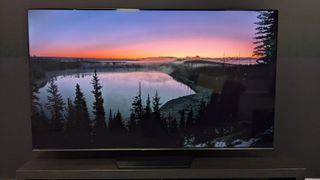
Specifications
Reasons to buy
Reasons to avoid
✅ You want outstanding value: Dynamic pictures, great gaming performance and features, and Google TV – the U7N delivers it all and also saves you money.
✅ You want a well-equipped gaming TV: The U7N carries up to 144Hz refresh rate, Dolby Vision gaming and VRR – features typically found on pricier sets.
❌ You'll be watching in large groups: The U7N's picture fades when viewed from off-center, with reduced contrast and more obvious backlight blooming.
❌You don't want to adjust settings: While the U7N's picture presets are adequate, it requires experimentation to get the most accurate images.
The Hisense U7N easily delivers some of the best bang for your buck in a 65-inch screen size, providing great quality images on a budget, a suite of useful gaming features, the Google TV smart TV platform and more – all for under $900.
Dynamic, bright and colorful, the U7N offers excellent picture quality for the money. It thrives with 4K Dolby Vision sources, showing strong details, accurate textures, rich contrast and solid black levels that can compete with some of the best mini-LED TVs – especially for the budget price it is. It's not all perfect as there is some backlight blooming, motion handling can be inconsistent and off-center viewing weakens picture quality, but some of this can be lessened by adjusting picture settings.
Gaming is another highlight for the U7N. It supports up to 144Hz refresh rate, VRR including AMD FreeSync Premium Pro and Nvidia GSync, and Dolby Vision gaming – features that in some cases aren't found on more premium gaming TVs. Couple that with a great all-around picture and performance and the U7N is a real gaming contender.
The Hisense U7N shows its budget design in some places. Its built-in sound lacks the prowess of more premium sets, with unimpressive Dolby Atmos and a limited soundstage, and its picture can be hit-and-miss, but it is tough to argue against just how good value the U7N is.
Read our full Hisense U7N review
The best budget 65-inch TV in the UK
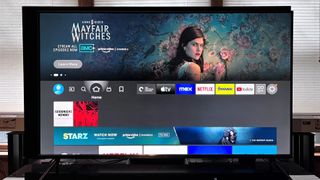
Specifications
Reasons to buy
Reasons to avoid
✅ You want bang for your buck: Stocked with plenty of features, the Amazon Fire TV Omni QLED is available in an array of sizes, all very competitively priced.
✅ You want good picture quality for less: The Omni QLED's picture is vivid and surprisingly natural for a TV at this price.
❌ You need the best built-in sound: The Omni QLED has a very average built-in sound and could benefit from a soundbar.
❌You need the best smart TV platform: Fire TV can be a little clunky to navigate and slow to respond at times so be prepared to have patience.
Amazon may not spring to mind when you think of TVs (not like Samsung or LG say) but its range of Omni TVs have always been good value for money. The Omni QLED is no exception, as it brings QLED technology in a 65-inch size at a budget-friendly price.
Although not stacked with features, the Amazon Omni comes with some decent specifications. With Dolby Vision IQ support, the Omni does a good job of displaying Dolby Vision content. It also features a built-in mic to allow for hands-free control of the TV using Alexa. Picture quality on the Amazon Omni QLED was a surprise and during our review, we saw just how good color looked on it.
The Omni isn't the best gaming TV on the market, and only features a 60Hz panel, but when we measured its input lag during our hands-on, it had a very respectable 10ms of input lag with Game mode activated, putting it up there with some of the best gaming TVs. It also comes built-in with Amazon's cloud-based gaming service Luna.
The Amazon Omni isn't going to set the TV world alight, but when it offers a solid QLED picture, Dolby Vision support, solid gaming performance and all at a low price, the Omni is a real contender within the budget 65-inch TV market.
Read our Amazon Fire TV Omni QLED review
The best mid-range 65-inch TV
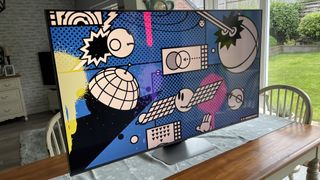
Specifications
Reasons to buy
Reasons to avoid
✅ You want a premium picture at a cheaper price: The Q80D's contrast and black levels are typical of more premium TVs
✅ You want a well-featured gaming TV for less: The Q80D's four HDMI 2.1 ports and 4K 120Hz, VRR and ALLM support are features found on more expensive TVs
❌ You don't want to play with settings: Out-of-the-box color can be an issue for the Q80D, so tweaking picture settings will be necessary
❌You need to view from multiple angles: Backlight blooming is noticeable on the Q80D when viewed off-axis, which can be an issue for larger group viewing
With surprisingly strong picture quality that rivals more expensive TVs, a near-full list of gaming features, and a competitive price, the Samsung Q80D delivers much more than the sum of its parts.
In our testing, we found the Q80D demonstrated better than expected contrast for a regular QLED TV. We did find its out-of-the-box color to be inaccurate, but some manual tweaking rectified the issue and allowed the Q80D to display a glorious picture.
It's rare at this price to find such an accomplished gaming TV. The Q80D has four HDMI 2.1 ports with support for 4K 120Hz, VRR including AMD FreeSync Premium Pro, and ALLM. Samsung's Gaming Hub allows for easy access to cloud-gaming apps and other settings, and an ultra-low 9.8ms input lag means this TV is "an outstanding gaming monitor," as we said in our review.
Another area where the Q80D impressed during testing was its built-in sound quality. It had an impressively large soundstage with excellent sound placement around the screen. We called the Q80D "one of the best-sounding TVs in Samsung’s 2024 range" which is no mean feat given the performance of the Samsung S95D and Samsung QN900D.
What's most impressive about the Q80D is its price. At this mid-range level, you'd usually expect picture quality sacrifices (mainly in contrast), but there the Q80D mostly proved us wrong. The Samsung Q80D really is the best mid-range TV you can get in a 65-inch size.
Read our full Samsung Q80D review
The best 65-inch premium OLED TV
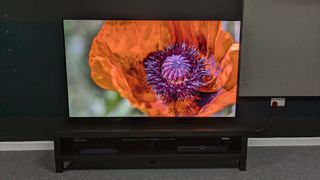
Specifications
Reasons to buy
Reasons to avoid
✅ You want excellent picture quality: QD-OLED and anti-reflection tech combine to give the S95D one of the best pictures we've ever seen.
✅ You want a premium TV for gaming: The S95D comes stacked with gaming features such as 144Hz and VRR, and games look great on it.
❌ You have a budget: The S95D carries a premium price for its features and will test a lot of people's budgets.
❌ You need Dolby Vision: The S95D supports all HDR formats except for Dolby Vision.
The Samsung S95D takes OLED picture quality a step further than its predecessor, the Samsung S95C. Carrying over the same QD-OLED technology as the S95C but combining it with new anti-screen reflection tech and AI features, the S95D offers unbeatable performance.
The picture quality of the S95D is nothing short of spectacular, with the deep blacks OLED TVs are known for but with increased brightness for punchier HDR highlights. But, the S95D's new OLED Glare Free tech means the contrast-rich picture can be enjoyed even in the brightest viewing conditions. Details on the S95D are incredibly intricate and refined, giving objects an almost 3D effect, while colors look bold, yet natural.
It's great for watching movies, but the S95D also has four HDMI 2.1 ports and supports gaming features including 144Hz refresh rate, VRR including AMD FreeSync Premium Pro, HGiG and more. It also features Samsung's useful Game Hub that brings everything gaming together, including cloud-based gaming services such as Xbox, Nvidia GeForce Now, Luna and others.
The S95D is a well-designed TV, with a sleek, modern look that adds to its premium feel, and its built-in sound is good too. You have to pay for these features, as the S95D's price will stretch budgets, but it's worth it if you can afford it. The Samsung S95D is the definition of a premium OLED TV.
Read our full Samsung S95D review
The best 65-inch OLED TV for sound
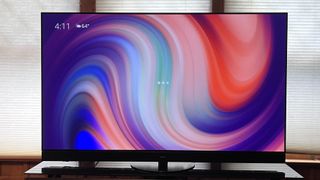
Specifications
Reasons to buy
Reasons to avoid
✅ You want a TV with powerful built-in sound: The Z95A’s 5.1.2-channel built-in speaker system does a fantastic job with immersive Dolby Atmos soundtracks. It’s good enough that you won’t need to add a soundbar.
✅ You want to watch in bright rooms: The Z95A’s picture is bright enough to hold up in bright room lighting conditions, and it also has an anti-reflection screen to reduce screen glare.
❌ You want the perfect gaming TV: The Z95A gaming features are well above average for a TV, but it only has two full-featured HDMI 2.1 ports and no built-in cloud gaming.
❌ You want the best smart TV interface: The Z95A’s Fire TV smart interface has an overly busy look, and given the TV’s flimsy handheld remote you may need to use the Alexa voice assistant for control.
The weak built-in speakers in most TVs can leave you struggling to hear dialogue in movies and TV shows, and may even sound distorted when you push the volume up too high. Panasonic addresses this problem in its Z95A OLED TV by incorporating a full 160W, 5.1.2-channel speaker system in the set’s frame. Packing in that many speakers adds to the Panasonic’s bulk, but if you’re looking for a TV that can play loud and clear enough that you don’t need to add a soundbar, the Z95A is the one.
Panasonic re-entered the US TV market in late 2024 with 55-inch and 65-inch versions of the Panasonic Z95A OLED. This flagship model features a “Master OLED Ultimate' display panel” that uses the same micro lens array (MLA) technology found in other top OLED TVs such as the LG G4, along with advanced heat management to boost peak brightness. HDR support extends to Dolby Vision IQ, HDR10+ Adaptive, and HLG, and there are both Filmmaker and Netflix Adapative Calibrated modes that provide dead-on accurate pictures out of the box.
For its 2024 TVs, Panasonic switched to Amazon’s Fire TV for streaming and smart TV functions and it’s a big improvement over the company’s previous My Home Screen platform. Gaming support includes 4K 144Hz, VRR (with Nvidia G-Sync and AMD Freesync Premium), and Dolby Vision Gaming (up to 144Hz), though there are only two HDMI 2.1 ports as opposed to the four we look for on the best gaming TVs.
Dedicated front left and right, center, and left and right surround speakers are built into the lower section of the TV’s frame and are augmented by a pair of up-firing Atmos height speakers. In our Panasonic Z95A review, we found that it delivered consistently clear dialogue, impressive spaciousness with Dolby Atmos soundtracks, and even good bass – a rare thing for a TV. A Space Tune feature uses a mic in the TV’s remote to automatically EQ the sound for your room, and there’s also a Sound Focus feature that can effectively compensate for off-center seating positions.
The Panasonic Z95A looks great, sounds great, and is a perfect 65-inch TV option for those who don’t want to deal with the extra expense and setup hassle of a soundbar. At $3,100 / £3,899, it’s definitely on the pricey side, but well worth it if you want one of the best TVs for sound.
Read our full Panasonic Z95A review
The best 65-inch TV for wall-mounting
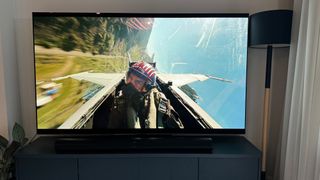
7. LG OLED65G4
Our expert review:
Specifications
Reasons to buy
Reasons to avoid
✅ You need a TV that looks great on the wall: The G4 boasts a thin depth and comes with a slim-fit mount, making it ideal for on-wall installation.
✅ You want a premium TV for gaming and movies: The G4 is stacked with gaming features and its second-gen MLA OLED panel takes pictures to another level.
❌ You want built-in sound: Although decent, the G4's built-in speakers can't compete with those in other sets such as the Sony Bravia 9.
❌You want the brightest OLED: While the LG G4 boasts good brightness for an OLED TV, it doesn't beat the likes of the Samsung S95D.
The LG G4 is a premium OLED TV that delivers excellent picture quality with second-generation MLA tech and a plethora of gaming features – all in a beautifully designed package with razor-thin depth.
Measuring at 1-inch (2.5cm) deep, the G4 is ideal for a flush wall-mount installation and comes with a G4-specific, slim-fit wall mount. In our review, we described the G4 as "a gorgeous TV with a virtually bezel-less build that will take pride of place if you choose to wall mount it." As a bonus, the G4 now comes with a stand (in specific sizes in the UK/US, but every size in Australia) so it can be placed on furniture as well.
The G4's picture expands on its G3 predecessor and is easily its highlight. LG's second-gen MLA OLED tech is a sight to behold, delivering excellent contrast, deep blacks and superb color reproduction. In our review, we said, "In practice, the combination of the new panel and processor is nothing short of phenomenal". We also complimented the G4's 4K upscaling, as it did a superb job improving the look of HD movies (in our case, Aliens on Disney Plus).
Gaming is also well accounted for on the G4, which has four fully equipped HDMI 2.1 ports providing 4K 144Hz, VRR (including AMD FreeSync and Nvidia GSync) and ALLM. It also features LG's Game Optimizer and game bar menu, which is great for quickly adjusting gaming settings. Playing Spider-Man 2 on PS5 on the G4, we found it ran "as smooth as butter".
While the G4 isn't the brightest OLED you can get (look to the Samsung S95D for that) and is still a premium-priced TV, the G4 delivers in most every category. (Even its built-in sound is solid, though not best-in-class.) For this marvel of an OLED TV, a wall-mount installation will be the best fit.
Read our full LG G4 review
The best gaming 65-inch TV
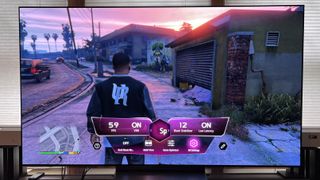
Specifications
Reasons to buy
Reasons to avoid
✅ You'll be gaming in a bright room: An anti-glare screen and high brightness make the LG C4 perfect for well-lit rooms.
✅ You want a superb gaming TV: The C4 is 144Hz certified and has cloud gaming options coupled with a dynamic picture.
❌ You want the brightest possible TV
The LG C4 is brighter than last year’s C3, but it doesn’t match the LG G3 or the best mini-LED TVs when it comes to brightness.
❌You want a cheap TV for gaming: The LG C4 is less expensive than flagship OLED TVs, but it's still pricier than other options on this list with good gaming support.
The LG C4 OLED is a fantastic TV for gaming, and it is also a perfect option for movie viewing owing to its punchy, color-rich picture with deep blacks and highly detailed shadows. A new Brightness Booster feature for the C4 brings its peak brightness in line with the Samsung S90C OLED TV that tops our list, but since the S90C is a 2023 model, it’s widely available at a discounted price.
LG’s new Alpha 9 AI Processor Gen7 is responsible for the C4’s brightness boost, and it also improves the audio quality of the TV’s built-in 2.2-channel speakers using AI to upmix to a virtual 9.1.2-channel Dolby Atmos format. LG’s latest mid-range 65-inch OLED TV also supports Dolby Vision, HDR10, and HLG high dynamic range, and there’s a new Dolby Vision Filmmaker Mode picture preset that makes movies viewed in Dolby Vision appear as the director intended.
What specifically makes the LG C4 great for gaming is its four HDMI 2.1 ports with 4K 120Hz, VRR, and ALLM support, which lets you connect both an Xbox Series X and PS5 console to the TV along with a soundbar. New LG TVs for 2024 are also the first to be 144Hz certified by Nvidia, making them perfect for PC gaming as well. Cloud gaming is another option on the C4, with support for GeForce Now, Amazon Luna, Utomik, Blacknut, and Boosteroid services in the TV’s webOS 24 smart interface’s Games Quick Card.
With an anti-reflection screen, the LG C4 can easily be used for daytime TV viewing or gaming, though it's not as bright as the Samsung QN90C mini-LED or Samsung S95D OLED models listed elsewhere in this guide. But given its great overall picture quality and well-rounded feature package for the price, the C4 is a recommended option for gaming, movies, and just about anything else
Read our full LG C4 TV review
Find the best deals on LG products with our LG coupon codes.
The best 65-inch TV for sports
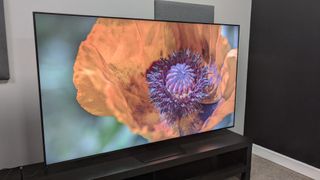
Specifications
Reasons to buy
Reasons to avoid
✅ You want great overall picture quality: The QN90D's high brightness, powerful contrast, and excellent motion handling make it a perfect TV for sports and movies
✅ You're a gamer: The QN90D is equipped with four HDMI 2.1 ports that support up to 4K 144Hz, and it has fantastic gaming performance as well.
❌ You want a high value TV :The QN90D is pricey compared to mini-LED TVs from brands like Hisense and TCL, though it offers several features those TVs lack.
❌ You want Dolby Vision HDR: Like all Samsung TVs, the QN90D doesn't support Dolby Vision HDR.
If you’re looking for a great 65-inch TV for daytime sports viewing, we can’t think of a better option than the Samsung QN90D. This mini-LED TV has an ultra-bright picture plus an anti-reflection screen that effectively reduces glare from overhead lights and undraped windows. Its motion handling capabilities are also strong, making fast-action sports – and games and action movies – look solid.
When we tested the Samsung QN90D, its peak brightness (measured on a 10% white window pattern) was 2,192 nits, and that same impressive performance extended to full-screen brightness, which peaked at 680 nits. Other top-tier TVs can hit similar brightness levels, but the QN90D also offers refined local dimming for inky blacks and detailed shadows when watching movies.
The QN90D is also a great choice for gaming. Its four HDMI 2.1 ports support 4K 120Hz (and up to 144Hz for PC gaming), VRR (including AMD FreeSync Premium Pro), and ALLM. We measured Input lag at an impressively low 9.9ms when we tested the QN90D, which also features Samsung’s Gaming Hub for cloud-based gaming using Xbox, Nvidia Geforce Now, Luna, and other services.
Along with its bright, refined picture, the Samsung QN90D has a remarkably slim, yet sturdy design with an all-metal base and bezel-free display. It comes with Samsung’s rechargeable SolarCell remote control, and a 4.2.2-channel, 60W built-in speaker array delivers powerful Dolby Atmos sound with an Object Track Sound+ feature for accurate placement of movie dialogue and sound effects.
Read our full Samsung QN90D TV review
How to choose the best 65-inch TV
What TVs are coming in 2024?
After CES 2024, we've now heard from the majority of brands, including LG, Samsung, TCL, Hisense and more, about what TVs they'll be offering in 2024, a good chunk of which will be available in 65-inch sizes.
From LG, there's LG C4, which has us excited thanks to its improved brightness (which we've seen in the flesh) and improved performance and new gaming features, including 144Hz refresh rate. There's also the LG G4, which again improves brightness and has 144Hz compatibility and, finally, an included stand!
From Samsung, there's the Samsung S95D, which not only has higher brightness (20% more than last year), but also has anti-glare technology to reduce reflections (which again, we've seen and it works well). as well as the Samsung QN90D and the There's also the Samsung S90D, follow-up to our top TV of 2023, the Samsung S90C, which again boasts higher brightness and some new smaller sizes (albeit with standard OLED panels, not QD-OLED).
TCL and Hisense both announced new TVs as well, with TCL grabbing headlines for its 115-inch mini-LED with 20,000 local dimming zones and Hisense, not looking to be outdone, announcing its own 110-inch model as well.
Should I buy a 65-inch TV?
We’ve answered this question in a much more detailed guide elsewhere on TechRadar, but the short answer is: yes, if you can afford to.
Basically, a bigger TV is often a better TV and, as mentioned earlier, these large-scale displays typically boast the best specification when it comes to new tech and useful features.
As 65-inch models are becoming increasingly popular, too, they’re also becoming less expensive, and we’d almost always recommend parting with a little bit more money to enjoy the benefits of such an impressive screen size.
Which is the best 4K TV brand?
The question of the best 4K TV brand (for 65-inch models, in particular) is a difficult one to answer when there’s so many great models out there. Displays from the likes of LG, Sony and Samsung regularly make this list, but they’re often joined by equivalent models from brands like Hisense and Panasonic.
A better question might concern what to look for when buying a 65-inch 4K TV, to which we’d say picture quality, app support, other handy bells and whistles like voice control and, of course, price.
Features like HDR support, Dolby Vision and Atmos, OLED panels and the like can be real differentiators, too, when it comes to finding the 65-inch 4K TV with the best viewing experience, though it’s no surprise that the more of these extras a display has, the more expensive it tends to be.
What is 4K resolution?
4K is, essentially, an ultra-high-definition screen resolution. Also called UHD or 4K UHD, the display technology has become the default screen resolution across all of the TVs that you’re likely to see in stores today – as well as many PC monitors, too.
The very best UHD TVs pack over eight million pixels in their high-res displays – that’s four times the amount you’ll find on the Full HD panels in today's small TVs.
You don’t necessarily need access to 4K entertainment content to enjoy the benefits of 4K resolution, either, since many of the best 4K TVs – i.e. most of the 65-inch displays on this list – boast impressive upscaling technologies that bolster content filmed in HD.
The only displays which sport a sharper picture are the 8K variety – though, being a still-new technology, choice in that department is much more limited and, naturally, 8K models are far more expensive.
4K resolution is increasingly common for new releases on the best streaming services, and obviously is needed to take advantage of the best 4K Blu-ray players. The PS5 and Xbox Series X consoles are also both built around 4K, so we focus on having 4K TVs in our list of the best gaming TVs.
How we tested the best 65-inch TVs
When we test the best 65-inch TVs, we structure our tests around the same criteria found throughout our reviews such as picture quality, gaming performance, and value for money. The TVs are tested using both objective measurements and subjective impressions.
Starting with picture quality, we’ll cycle through the TV’s preset picture modes such as Standard and Movie to see which is most accurate. We’ll then play a variety of sources including 4K Blu-ray and streaming, HD Blu-ray and streaming, and lower-resolution sources to test upscaling, which is important on a larger screen size such as a 65-inch TV.
Testing picture quality on 65-inch TVs, we look at how well the panel, particularly on LCD models, handles black uniformity (the ability to evenly display dark tones across the screen) as larger LCD screens tend to struggle with this. We also evaluate how well a 65-inch screen maintains contrast and color accuracy from off-center seats, which is another variable with LCD-based TVs.
For our objective tests, we use specialized equipment including a colorimeter to measure the patterns displayed by a test pattern generator and record the results with Portrait Displays’ Calman calibration software.
The first area we test is brightness using different-sized white windows such as 10% (for HDR highlights) and full-screen brightness. A 10% window will indicate what peak brightness to expect and also demonstrate a TV's effectiveness in reproducing highlights from HDR sources. The 100% window will demonstrate how a TV can maintain brightness levels across the entire screen, important for content like sports, and also tell us how it will handle reflections. We also use these brightness tests to compare a set’s measured brightness to the brightness claims made by manufacturers. When we test brightness, the measurements are made in a light-controlled room to prevent other light sources from skewing the results.
Another area we test is color reproduction with both HDR and SDR sources, looking at color accuracy and maximum color gamut coverage. We also test grayscale accuracy to see how effectively a TV reproduces grayscale steps in the full contrast range from black to white.
For gaming, we use a Leon Bodnar 4K HDMI Input Lag Tester to test how much latency is added by each TV, comparing results in Standard and Game Mode, which typically shows the lowest amount. We’ll also look at each TV’s gaming performance and features such as VRR, ALLM, and 4K 120Hz refresh rate.
We always aim to keep tests and conditions as consistent as possible, but it’s worth noting that some of our reviewers have different setups, though our writers will have similar testing equipment to achieve the same level of accuracy.
The latest updates to this best 65-inch TVs guide
25 October 2024
Replaced the Sony A80L with the Panasonic Z95A as 'best OLED TV for sound'
26 September 2024
Replaced the Samsung S90C with the Samsung S90D as 'best for sports'
29 August 2024
Replaced the LG G3 with the LG G4 as 'best for wall-mounting'
1 August 2024
Replaced the Hisense U8K with the Samsung Q80D as 'best mid-range'
2 July 2024
Introduced Hisense U7N as 'best budget (US). Amazon Omni QLED became 'best budget (UK)'.
4 June 2024
Replaced Samsung QN90C with LG OLED C4 as 'Best gaming TV.' Added Samsung QN90C as 'Best TV for sports.'
7 May 2024
Replaced Samsung S95C with the Samsung S95D as 'Best premium OLED' due to improved features over the S95C.
Read more updates
27 February 2024
Expanded the 'How We Test' section to explain in more detail how we test these TVs.
26 January 2024
Updated FAQ's section with 'what TV's are coming in 2024?' section, looking ahead to what new TVs we're most excited for.
19 November 2023
Added in 'Buy it if' and 'Don't buy it if' boxes for each entry to summarize pros and cons for quick reading
14 November 2023
Replaced Sony A95K with Samsung S95C and re-named category 'best premium OLED'. Replaced Samsung QN900B with Samsung QN900C as best 8K TV. LG G3 became 'best TV for wall-mounting'.
3 October 2023
Swapped LG's C3 for Samsung's S90C as best OLED TV overall, replaced the TCL QM8 Class with Amazon's Fire TV Omni QLED as the best budget buy, added Hisense's U8K in replace of Samsung's BU8500 and removed Samsung's S95C for LG's G3 as brightest OLED.
26 June 2023
Added this new 'Latest updates' section to help readers know how we've changed the guide recently. Checked all products against our latest reviews.
30 May 2023
Checked list of products against our latest reviews. Added more about how we test TVs to the introduction.
28 April 2023
Reordered products to reflect latest recommendations. Added new easier navigation features.
Get the best Black Friday deals direct to your inbox, plus news, reviews, and more.
Sign up to be the first to know about unmissable Black Friday deals on top tech, plus get all your favorite TechRadar content.

Matt is TechRadar's Managing Editor for Entertainment, meaning he's in charge of persuading our team of writers and reviewers to watch the latest TV shows and movies on gorgeous TVs and listen to fantastic speakers and headphones. It's a tough task, as you can imagine. Matt has over a decade of experience in tech publishing, and previously ran the TV & audio coverage for our colleagues at T3.com, and before that he edited T3 magazine. During his career, he's also contributed to places as varied as Creative Bloq, PC Gamer, PetsRadar, MacLife, and Edge. TV and movie nerdism is his speciality, and he goes to the cinema three times a week. He's always happy to explain the virtues of Dolby Vision over a drink, but he might need to use props, like he's explaining the offside rule.
- James DavidsonTV Hardware Staff Writer, Home Entertainment